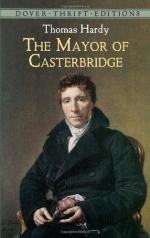Henchard had already heard that High-Place Hall was being prepared for a tenant. He said with a puzzled air to the first person he encountered, “Who is coming to live at the Hall?”
“A lady of the name of Templeman, I believe, sir,” said his informant.
Henchard thought it over. “Lucetta is related to her, I suppose,” he said to himself. “Yes, I must put her in her proper position, undoubtedly.”
It was by no means with the oppression that would once have accompanied the thought that he regarded the moral necessity now; it was, indeed, with interest, if not warmth. His bitter disappointment at finding Elizabeth-Jane to be none of his, and himself a childless man, had left an emotional void in Henchard that he unconsciously craved to fill. In this frame of mind, though without strong feeling, he had strolled up the alley and into High-Place Hall by the postern at which Elizabeth had so nearly encountered him. He had gone on thence into the court, and inquired of a man whom he saw unpacking china from a crate if Miss Le Sueur was living there. Miss Le Sueur had been the name under which he had known Lucetta—or “Lucette,” as she had called herself at that time.
The man replied in the negative; that Miss Templeman only had come. Henchard went away, concluding that Lucetta had not as yet settled in.
He was in this interested stage of the inquiry when he witnessed Elizabeth-Jane’s departure the next day. On hearing her announce the address there suddenly took possession of him the strange thought that Lucetta and Miss Templeman were one and the same person, for he could recall that in her season of intimacy with him the name of the rich relative whom he had deemed somewhat a mythical personage had been given as Templeman. Though he was not a fortune-hunter, the possibility that Lucetta had been sublimed into a lady of means by some munificent testament on the part of this relative lent a charm to her image which it might not otherwise have acquired. He was getting on towards the dead level of middle age, when material things increasingly possess the mind.
But Henchard was not left long in suspense. Lucetta was rather addicted to scribbling, as had been shown by the torrent of letters after the fiasco in their marriage arrangements, and hardly had Elizabeth gone away when another note came to the Mayor’s house from High-Place Hall.
“I am in residence,” she said, “and comfortable, though getting here has been a wearisome undertaking. You probably know what I am going to tell you, or do you not? My good Aunt Templeman, the banker’s widow, whose very existence you used to doubt, much more her affluence, has lately died, and bequeathed some of her property to me. I will not enter into details except to say that I have taken her name—as a means of escape from mine, and its wrongs.
“I am now my own mistress, and have chosen to reside in Casterbridge—to be tenant of High-Place Hall, that at least you may be put to no trouble if you wish to see me. My first intention was to keep you in ignorance of the changes in my life till you should meet me in the street; but I have thought better of this.




